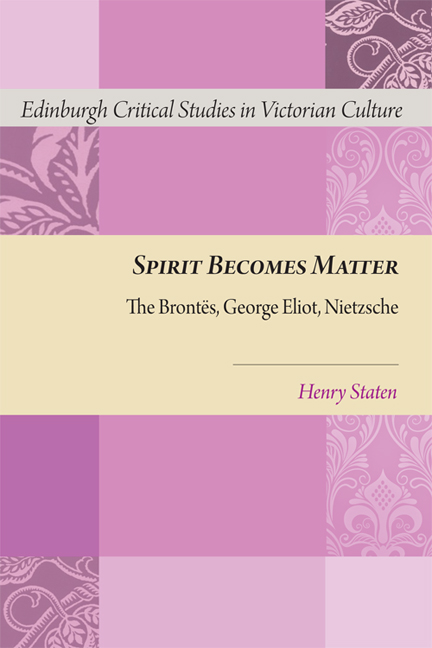Book contents
- Frontmatter
- Contents
- Series Editor's Preface
- Author's Preface
- Acknowledgements
- Dedication
- Introduction
- 1 The Poisoned Gift of Forgiveness (Jane Eyre)
- 2 Subincision of the Ethical Subject (Middlemarch)
- 3 What Things Cost in Middlemarch
- 4 The Return to the Heath (Wuthering Heights)
- 5 Spirit Becomes Matter
- Index
2 - Subincision of the Ethical Subject (Middlemarch)
Published online by Cambridge University Press: 05 August 2016
- Frontmatter
- Contents
- Series Editor's Preface
- Author's Preface
- Acknowledgements
- Dedication
- Introduction
- 1 The Poisoned Gift of Forgiveness (Jane Eyre)
- 2 Subincision of the Ethical Subject (Middlemarch)
- 3 What Things Cost in Middlemarch
- 4 The Return to the Heath (Wuthering Heights)
- 5 Spirit Becomes Matter
- Index
Summary
Middlemarch is a meditation on the nature of ethical consciousness, a meditation that goes far beyond the moral ideology of its time, of its narrator, and of the critics who have been taken in by the narrator's moralism. Despite her rejection of Christian supernaturalism, or even perhaps because of it, George Eliot remains tied to the moral discourse of Christianity. The language of desire or inclination as the source of wrong action, and of duty and self-denial as its corrective, has an even stronger hold on Eliot's moral consciousness than it does on Charlotte Brontë's; and the authoritative declarations of her narratorial persona tend to skew the reader's attention along the ethical or moral groove laid down by this language. Yet her observation of the currents and eddies of consciousness is so attentive, so compelled by that same requirement of scientific scrupulosity she inscribes within the text itself as Lydgate's ideal, that her representation of ethical consciousness from the outset fractures the ideological frame of morality within which she attempts to contain it.
‘Drawing on contemporary developments in scientific theory,’ Sally Shuttleworth explains, ‘George Eliot employs the idea of channelled, free-flowing energy to establish a value framework for her novel’; but ‘Dorothea's natural energy is blocked, dissipated by socially created friction’. This naturalistic stratum of Middlemarch is in accordance with Lewes's theory that psychology was based on the physiological flow of energy, the tendency of sensation ‘to discharge itself through the readiest channel’.1 Following the protocols of this form of analysis, Eliot's narrator tracks the movements, blockages and subterranean expressions of Dorothea's exigent surge of world-shaping energy; at the same time, the narrator continually reasserts an ideal of self-overcoming in the service of moral ideals that, as I will show, can be wildly disconnected from what is being rigorously described in naturalistic terms. But Dorothea herself perceives her own motives only on the level of the idealizing discourse of morality, with the consequence that the fullest meanings of her own moral psychology remain hidden from her.
- Type
- Chapter
- Information
- Spirit Becomes MatterThe Brontes, George Eliot, Nietzsche, pp. 76 - 111Publisher: Edinburgh University PressPrint publication year: 2014



